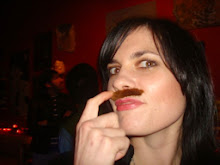Almost every day I see someone say that they’re not
racist or sexist. Sometimes they literally say, “I’m not racist, but…”
Sometimes it’s more subtle than that. Sometimes it’s terribly blatant, but only
to those who are awake to much more subtle and pervasive forms of racism and
misogyny. And it seems that many white people and men believe that if they
simply say that they believe in some very basic rights for people of color and
women and don’t even see color, they can then speak with impunity.
This is why I don’t really think it’s helpful for us to
freak out when blatantly racist and sexist people say blatantly racist and
sexist things. It’s the micro-aggressions that do far more damage to actual
lives and are far harder to weed out, especially when micro-aggressors can
point to the flagrant and obvious aggressions and compare themselves to those
with positive results.
You can be white and buy into white supremacy and have
no problems with interracial marriage. The fact that we as a society still
appear to believe that we can point to a few overt strides in civil rights and
tell ourselves that we live in a post-racial society actually stands in the way
of our doing real work to overcome discrimination in our society. The same
holds true with strides made by the feminist movement. I’ve had male acquaintances
claim they’re “totally feminist” because they believe women should be free to
speak their minds, when that is but the bare minimum and they continue to spew
misogynist thinking all over the place (that I am then, I suppose, free to call
them out on – oh goody).
The other day I watched a panel discussion between civil
rights leaders in 1963 that originally aired in 1963. At some point, one of the
men says that they will know that civil rights have become a reality when black
unemployment isn’t twice that of white unemployment. My heart sank. Last year I
looked up unemployment statistics by race, and black unemployment was…twice
that of white unemployment. It was as if nothing had changed. Employment opportunity
is at the center of people’s ability to live free, equitable lives. If we’re
not fighting for employment opportunities for all people, then we are not
fighting for civil rights. And yet we defend ourselves and white supremacy when
we say that we’re past racism now. Surely, we may feel we’re past the use of
racial epithets as white progressives. But we still question people when they
interrogate what we’ve actually done to dismantle white supremacy. We say, “We don’t
say certain words anymore and interracial marriage is legal! What more do you
want from us?” I mean, it is ridiculous, and yet even most white progressives I
know refuse to interrogate their own racism because they don’t use slurs
(except when it’s funny!) and they aren’t the ones not hiring black people
(therefore they’re not involved in systemic racial injustice at all), so they
can’t possibly be racist!
I remember the moment I realized I was an alcoholic. I
literally could not see it a single second before that point, but after that
moment is was as clear as day. And it became clear that it should’ve been
obvious months before. I’d been seeking help for deep depression and suicidal
ideation, but if anyone pointed out that I might have a problem with alcohol, I
simply stopped talking to them. I believed they were wrong because I wanted to
believe they were wrong. I wasn’t mentally ready to give up my alcohol yet, so
I COULD NOT SEE IT. And I’ve had the experience, too, of not seeing white
supremacy. I’ve defended my own problematic behavior, claiming that I didn’t
like the way I was being called out on it. It takes pretty constant exposure to
ideas that cause you to interrogate your own beliefs and every corner of your
thinking before you can see what everyone is talking about. It took a lot of
people pointing out the ways alcoholism manifested in my life, and then it took
me actually seeing those things happening and recognizing them as alcoholism.
It was a process, but the process was invisible until that moment that it
clicked into place.
My declaring myself not an alcoholic didn’t make it so. I
was always an alcoholic. And declaring oneself not racist or sexist doesn’t
make it so, either. I feel like I shouldn’t have to say these things. I feel
like I’m probably saying something that other people have said before. I feel
like this shouldn’t even be revolutionary thought. But considering the number
of times in a single day that I see people in both my real life and the media
shoot down claims of racism and sexism with a very quick defense without any
consideration of systemic injustice, I figure it does indeed need to be said.
Nothing really changes when we only focus on superficial
markers of what white supremacist patriarchal capitalism (i.e. “mainstream
American culture”) calls racist and sexist.


